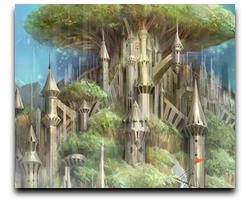 There is room to grow in the world of massive multiplayer online gaming. A large online community should not have to subscribe to a monthly charge to play great MMORPG’s because there are other known models that work, including the micro-transaction based MMO.
There is room to grow in the world of massive multiplayer online gaming. A large online community should not have to subscribe to a monthly charge to play great MMORPG’s because there are other known models that work, including the micro-transaction based MMO.
At first, this sounds like a dirty word, micro-transaction. Often we relate it with being “nickle and dimed” through a video game by means of dirty marketing which feeds our enthusiastic gamer addiction. Put this thought aside for a minute and keep an open mind.
Imagine a game with worlds the size of World of Warcraft and stories as in-depth as Guild Wars (which is not monthly itself) but free from monthly payments (or “playments” a new term that needs to be coined). The reason behind the monthly charge covers service fees, technical support staff, bandwidth, servers and sheer volume of Activision Blizzards user base.
The micro-transaction concept could still help pay for all the overhead of running an online gaming business because gamers tend to be over-enthusiastic about their great addictive games. If you build a game with excellent content, replay value and strive for a community atmosphere a micro-transaction title can work just as well as a subscription based game.
One beautiful aspect to micro-transaction models is paying for content when you’re willing to pay. This includes cosmetic character alterations, basic needs items (health potions) and other products to enhance the playability of the game without requiring the gamer to do so. There will be some gamers that use this as a “free ride” and never buy anything while other gamers spend way too much because they have expendable income which helps balance out costs.
The trick to a micro-transaction game balance is allowing players to enhance their experience without taking away or crippling their game to force a micro-transaction. You do not need a “fire enchantment” which causes a bit more damage and looks really cool, but it can make your character look more sinister and provide slight benefits to battle.
Wouldn’t this make the rich more powerful than those without a lot of cash? It might might them moderately more powerful and definitely more pretty to look at, but it also allows players who would never be able to experience any of the game a chance to play. In some ways, the level ground is already broken in MMO’s like World of Warcraft based purely on game experience… a player who’s been playing for three years and has a level 70 character will dominate a person with casual gaming habits. Nothing in the world is fair, at least this gives lower level characters a chance to spend some cash to get their character on par when they’ve not got time to work through the game with hours of time investements.
A player that can’t play World of Warcraft but would love to play the hot game is worse off than having battled someone with a better ring, more options and a lightening staff. At least gamers with small budgets can have a massive multiplayer experience without having to foot the bill for a monthly subscription.
There is a time and place for subscription and micro-transaction style games, it might be time to try a micro-transaction system in the United States to help compete against the World of Warcraft addiction. The trick will be to provide users with a great game play experience, higher end graphics, professions, side-quests and storylines with many possibilities.
Try a micro-transaction title today, checkout Florensia Online and Silk Road Online.

 As Bob Dylan once wrote, “The times they are a-changin'” and id Software may be ready to change with these times. They’re talking at Quake Con about both DOOM 4 and their next title Rage (a first person shooter car driving game) both utilizing the same engine, the Tech 5 engine, and being developed simultaneously.
As Bob Dylan once wrote, “The times they are a-changin'” and id Software may be ready to change with these times. They’re talking at Quake Con about both DOOM 4 and their next title Rage (a first person shooter car driving game) both utilizing the same engine, the Tech 5 engine, and being developed simultaneously. “Questing.”
“Questing.”
sure micro-transactions are fine if the people who spent shit loads only played a bit, but the majority of people who spend real money on in-game items are old people, who are retired or in college and play 24/7. The best type of game is one like Guild wars with no monthly fee and no sale of in-game items, because otherwise old people who shouldn’t be on games just beat all the normal players (people under 18).
I’m a great propnent of micro transactions. I thought WoW had already established it, didn’t they?
No, not really. You can buy some stuff, like silly pets on their website that give you codes in the game to unlock pets, but not really micro-transactions in the true sense.